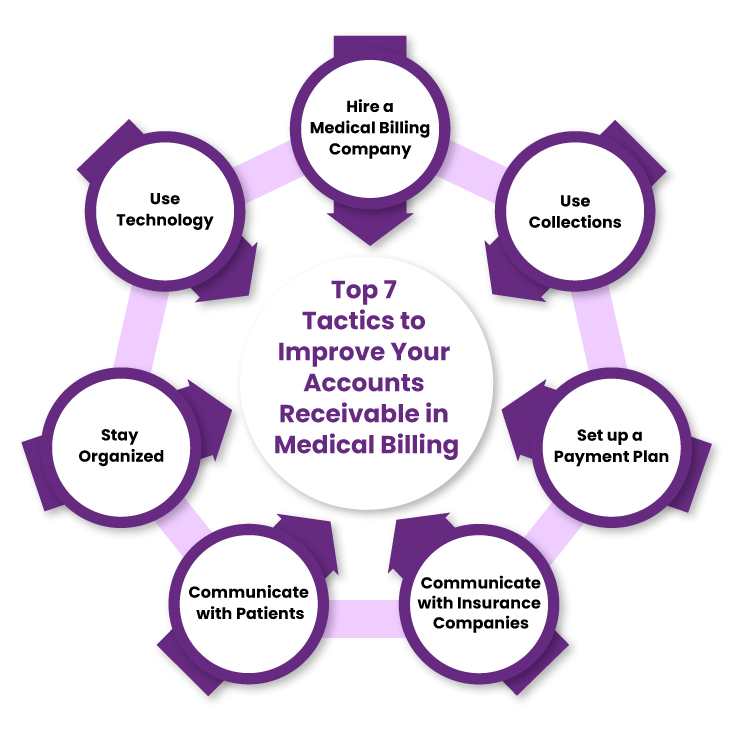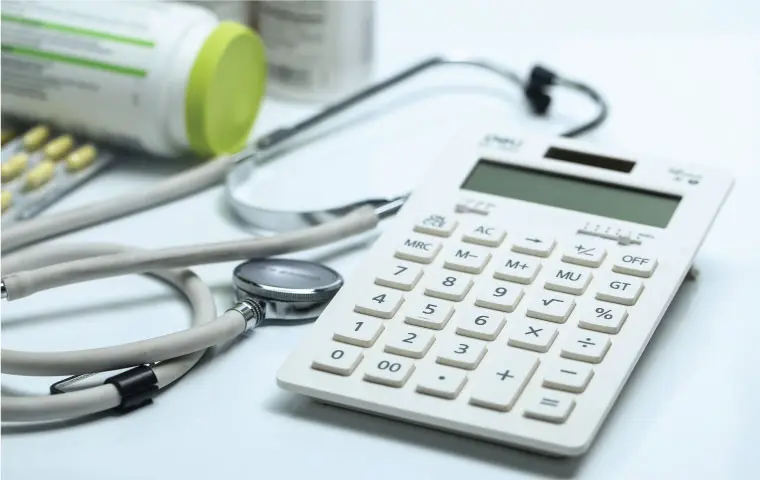Medical billing is a complex and often daunting task. It encompasses a wide range of activities, from submitting insurance claims to tracking payments and compiling reports. And while the role of accounts receivable in medical billing is critical, it can be difficult to manage all the various aspects of this process effectively. Fortunately, there are a number of tactics you can use to improve your A/R in medical billing. In this article, we will explore seven of the most effective methods for doing so.
Accounts Receivable In Medical Billing: What Does it Mean?
Accounts receivable refers to the money that a medical practice is owed by patients and insurance companies. This can include both payments for services rendered and reimbursement for services already paid out of pocket.
Another aspect of A/R follow up is eligibility and benefits verification. This includes checking to see if a patient is eligible for coverage under their insurance plan and what benefits are available to them. This process can be time-consuming, but it is essential in order to ensure that the practice is billing correctly and not leaving money on the table.
A/R management is important because it directly impacts the cash flow of a medical practice. When A/R is high, it means that the practice is bringing in less money than it is owed. This can quickly lead to financial problems, as the practice may have difficulty paying its expenses.
Factors Contributing To High A/R.
High A/R is often the result of a number of different factors. Common causes include:
Slow insurance reimbursement
Insurance companies often take weeks or even months to process and reimburse claims. This can tie up a considerable amount of money that the practice is owed.
Inaccurate coding
If medical billing codes are incorrect, insurance companies may deny claims or reimburse at a lower rate. This can lead to delayed or reduced payments.
Patient non-payment
Patients may fail to pay their portion of the bill, either because they cannot afford it or because they dispute the charges. This can also lead to significant financial problems for the practice.
The factors mentioned above clearly dictate that to avoid or reduce accounts receivable issues in your medical billing, you will need to take a proactive approach. Therefore, tracking your accounts receivable in medical billing and using some helpful tips to improve this number is crucial for the financial well-being of your practice.
Tracking your accounts receivable
There are a number of reasons why it is important to track your A/R in medical billing. Not doing so can lead to a number of problems, including:
You may not get paid in a timely manner
If you do not keep track of your A/R, it will be difficult to know when payments are due. This can result in delayed payments and put a strain on your cash flow.
You may miss out on payments
If you are not tracking your A/R, you may miss out on payments that are owed to you. This can happen if a patient pays their bill but you do not record the payment or if an insurance company processes a claim but you do not receive the payment.
You may have difficulty budgeting
Not tracking your A/R can make it difficult to budget properly for your practice. This is because you will not have a good understanding of how much money is coming in or when it will be received.
You may accrue too much debt
If you do not track your A/R, patients may accrue too much debt. This can lead to financial difficulties for them and put a strain on your relationship.
You may suffer legal consequences
You may be subject to legal action if you do not track your A/R. This can include being sued by a patient or an insurance company.
There are a number of ways to track your A/R in medical billing. The most important thing is to choose a method that works for you and your practice. The 3 common methods include:
1. Manual tracking
With manual tracking, you keep track of your A/R using paper records or a spreadsheet. This can be time-consuming, but it is a good option if you have a small number of patients or if you do not process many claims per month.
2. Electronic tracking
With electronic tracking, you use software to track your A/R. This can be more efficient than manual tracking, but it requires an upfront investment.
3. Third-party tracking
With third-party tracking, you outsource the task of tracking your A/R to a company that specializes in this. This can be a good option if you do not have the time or resources to track your A/R yourself.
Top 7 Tactics to Improve Your Accounts Receivable in Medical Billing
Now that we have discussed the importance of tracking your A/R, let's take a look at seven tactics you can use to improve your accounts receivable in medical billing.

1. Use technology
Technology is one of the best ways to improve your A/R in medical billing. Several software programs can help you track your A/R and make sure that payments are received in a timely manner.
2. Stay organized
Another way to improve your A/R in medical billing is to stay organized. This means keeping track of all bills, invoices, and payments. It also means having a system to follow up on late payments.
3. Communicate with patients
It is essential to communicate with patients about their bills. This includes letting them know how much they owe and when payment is due. It also means being available to answer any questions they may have.
4. Communicate with insurance companies
It is also important to communicate with insurance companies. This includes submitting claims on time and following up on payments.
5. Set up a payment plan
If a patient is having difficulty paying their bill, you may want to set up a payment plan. This will help them to pay off their debt over time and avoid any legal consequences.
6. Use collections
If a patient is delinquent on their bill, you may need to use collections. This is a last resort but can help you get the money you are owed.
7. Hire a medical billing company
One of the best ways to improve your A/R in medical billing is to hire a medical billing company. These companies specialize in billing and can help to enhance your A/R by staying organized, communicating with patients and insurance companies, and using collections when necessary.
Medical billing companies can help you save time and money while improving your A/R. Some of the ways they can do this include:
-
Automating your billing process
-
Sending out reminders to patients
-
Following up with insurance companies
-
Helping you select the right software
-
Negotiating payment plans
-
Utilizing collection agencies
Conclusion
Accounts receivable in healthcare is important to track for many reasons. The most important reason is to ensure that you are paid for the services you provide. There are a number of ways to track your A/R, and the best method will depend on your specific needs.
You can use technology, stay organized, communicate with patients and insurance companies, and hire a medical billing company to help you improve your A/R. Outsourcing your medical billing to a company can free up your time to focus on your patients and your practice.
If you are interested in learning more about how a medical billing company can facilitate you, HMS USA LLC Medical billing company in NY, would be happy to help you get off on the right foot. We have the experience and expertise to help you with your accounts receivable in medical billing.
ABOUT AUTHOR

Tammy Carl
As a blog writer with years of experience in the healthcare industry, I have got what it takes to write well researched content that adds value for the audience. I am a curious individual by nature, driven by passion and I translate that into my writings. I aspire to be among the leading content writers in the world.
